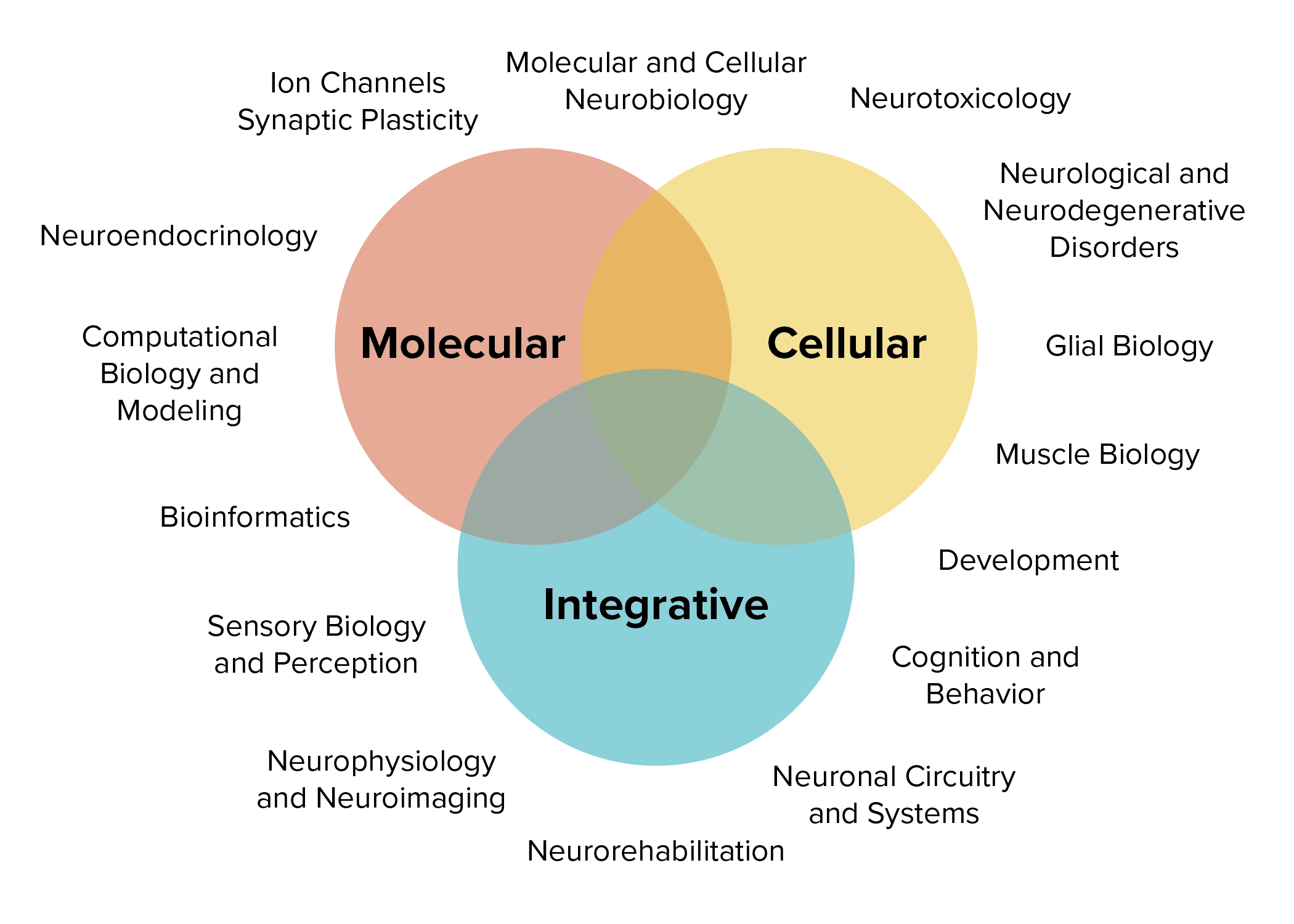MCIN Research Areas
The Molecular, Cellular and Integrative Neuroscience (MCIN) Program is a multidisciplinary program of interactive research and teaching across disciplines that includes more than 30 faculty members and approximately 50 postdoctoral trainees, graduate students and research staff distributed widely across various colleges and departments of Colorado State University. This integrative approach to study of the nervous system and muscle involves the use of methods in biochemistry, molecular biology, genetics, neurobiology, physiology, electrophysiology, psychology, microscopic imaging, bioinformatics and computational biology. Major areas of research to which these methods are applied are shown below with links to the faculty groups involved and the major questions being addressed.

Graduate Training Resources
CSU Specialized Research Facilities
- Chemistry Central Instrument Facility
- Flow Cytometry Facility
- Laboratory Animal Research Facility
- Microscope Imaging Network
- Molecular Quantification Core
- Next Generation Sequencing and Proteomics Core
- Protein Facility
- Proteomics and Metabolomics Facility
- Statistical Laboratory
Affiliated Graduate Degree Programs
- Biochemistry and Molecular Biology
- Biology
- Biomedical Engineering
- Biomedical Sciences
- Cell and Molecular Biology
- Computer Sciences
- Environmental and Radiological Health Sciences
- Microbiology, Immunology and Pathology
- Occupational Therapy
- Psychology
Postdoctoral Research in MCIN
The MCIN Program seeks applications for postdoctoral researchers. New positions in individual laboratories may become available at any time depending on funding availability. However, all faculty members are happy to sponsor applicants for postdoctoral fellowships, so please contact individuals with whom you would like to work as early as possible prior to completing your doctoral degree to arrange an interview and begin to prepare an application for external support.
Application procedure:
Send resume, copies of two papers or manuscripts submitted, and three letters of reference to the faculty member with whom you would like to work.
MCIN Program:
This interdisciplinary graduate research and education program, established in 1986, has 30 faculty participants. The international reputation of the faculty members and their ability to attract strong extramural support has resulted in the program being designated as one of Colorado State University’s Programs of Research and Scholarly Excellence. Faculty research interests are focused in cellular, molecular and integrative neurobiology, with emphasis in areas related to neuronal differentiation, degeneration and regeneration, ion channels and membrane physiology, synaptic mechanisms, neuronal circuitry and chronobiology, sensory biology, artificial neural networks, neurovirology and cognitive neuroscience. The neuroscience community is a close-knit and highly interactive one that offers trainees a friendly but rigorous learning environment. There is ample opportunity for informal interactions between trainees and faculty, ehus encouraging the kind of discussions and collaborations that are critical to success in the cutting-edge atmosphere of modern neurobiology. Program faculty members are housed in modern research buildings with state-of-the-art equipment. University facilities that support research efforts include electron microscopes, flow cytometers and fluorescent activated cell sorters, confocal microscopes and genomics and proteomics laboratories. The hard work of research is balanced by the unique opportunity to relax and reflect in the mountains and canyons of beautiful Colorado.
Location:
Fort Collins, an active, growing community of about 150,000 residents, is nestled along the beautiful Front Range, with Rocky Mountain National Park located less than a 1-hour drive away. At an elevation of 5,000 feet, Fort Collins enjoys a moderate climate typified by warm and sunny days, low humidity, and cool nights. An abundance of mountain recreational activities exist close to Fort Collins, including skiing (downhill and cross-country), hiking, camping, fishing, white-water rafting, rock-climbing and mountain climbing. Fort Collins is a highly educated community, with many residents employed by the University of by various computer and high-technology industries. The Lincoln Center cultural facility is the home of the city’s resident symphony orchestra, theater, and opera companies. The Denver metropolitan area, 60 miles south, is home to about 2 million people and offers professional sports teams, excellent museums, and a large performing arts complex.
Colorado State University is an equal opportunity/affirmative action employer and complies with all Federal and Colorado State laws, regulations, and executive orders regarding affirmative action requirements in all programs. The Office of Equal Opportunity is located in 101 Student Services. Ethnic minorities, women, and other protected class members are encouraged to apply and to so identify themselves in order to assist Colorado State University in meeting its affirmative action responsibilities.
